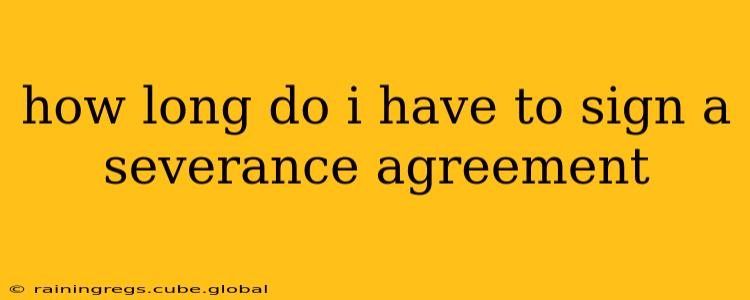The question of how long you have to sign a severance agreement is a crucial one, and unfortunately, there's no single, simple answer. The timeframe depends heavily on several factors, including the specifics of your agreement, your location (state and country), and the circumstances of your termination. Let's break it down:
What's Typically Included in a Severance Agreement?
Before we delve into timelines, it's vital to understand what's usually included in a severance agreement. These agreements often outline:
- Severance Pay: The amount and method of payment (lump sum, installments, etc.).
- Benefits Continuation: How long health insurance, retirement contributions, or other benefits will continue.
- Release of Claims: This is a critical part. You're typically agreeing to release your employer from liability for any future claims related to your employment, including potential claims of wrongful termination, discrimination, or harassment. This is why seeking legal counsel is strongly advised.
- Confidentiality: Clauses that restrict you from disclosing information about the company or the termination process.
- Non-Compete Clause: Potentially restricts your ability to work for a competitor for a specified period and/or geographic area.
- Return of Company Property: Outlines the process for returning company equipment, laptops, etc.
How Long Do I Have to Decide? The Time Sensitivity Factor
There isn't a legally mandated, universal deadline. However, the severance agreement itself will usually specify a deadline for acceptance. This deadline can range from a few days to several weeks, sometimes even a month or more. Always carefully review the agreement's stated deadline. Missing this deadline could mean losing your severance benefits entirely.
What Happens if You Miss the Deadline?
The consequences of missing the deadline are generally unfavorable. You risk losing your severance pay and other benefits outlined in the agreement. Your ability to pursue legal action against your employer may also be significantly impacted, particularly if the release of claims section was a key component.
The Importance of Legal Counsel
This is where seeking legal advice becomes paramount. A lawyer specializing in employment law can review the agreement thoroughly, identify any potential pitfalls or unfair clauses, and advise you on the best course of action, including the implications of accepting or rejecting the agreement within the specified timeframe. They can help you understand your rights and negotiate better terms if necessary.
Don't Rush the Process!
The pressure to sign quickly is often a tactic. Take your time, read every detail carefully, and understand the long-term implications before committing.
Additional Factors Influencing Decision Time
- Your Financial Situation: Assess your current financial standing and whether the severance package offers sufficient support during your job search.
- Your Career Goals: Consider how the non-compete clause (if any) might affect your future employment opportunities.
- Strength of Your Case: If you believe you have grounds for a wrongful termination lawsuit, you'll need to weigh the potential payout against the severance offer. A lawyer can help you evaluate this.
Frequently Asked Questions (FAQs)
Can I negotiate the terms of a severance agreement?
Yes, often you can. An employment lawyer can assist in negotiating for better terms, such as extending the deadline, increasing severance pay, or modifying other unfavorable clauses.
What happens if the severance agreement isn't fair?
You have the right to reject the agreement. However, be aware that this could impact your ability to pursue other legal avenues. Legal counsel is vital in such situations.
What if I'm pressured to sign quickly?
Don't be pressured! Take your time, seek legal advice, and don't sign anything you don't fully understand.
Is it always necessary to hire a lawyer?
While not always strictly necessary for simple agreements, seeking legal counsel is highly recommended, especially for agreements with complex clauses or significant financial implications. The cost of a lawyer's consultation can often be far less than losing out on substantial severance benefits due to an oversight.
In conclusion, while the specific timeframe for signing a severance agreement varies, the importance of carefully reviewing the document and seeking legal advice cannot be overstated. Don't rush this critical decision. Your future financial well-being and career prospects may depend on it.
